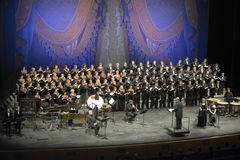| Opera Reviews | 27 April 2024 |
Shchedrin's choral opera gets an inspired performanceby Silvia Luraghi |
|
| Shchedrin: Boyarina Morozova Mariinsky Theatre, St Petersburg 21 June 2015 |
|
|
Among Russian titles this year, the company chose two recent operas by composer Rodion Shchedrin - Boyarina Morozova and The Lefthander. The former, whose full title is The Life and Sufferings of Boyarina Morozova and Her Sister Princess Urusova, is described in the score as a “choral opera in two parts for four soloists, mixed chorus, trumpet, kettledrums and percussion.” In reality, it has rather the shape of an oratorio, and in fact it has never been staged, but only performed in concert form since its premiere in 2006 at the Great Hall of the Moscow Conservatory. Boyarina Morozova, the main character, is one of the most famous among the ‘Old believers’, who reacted to innovations brought into the liturgy by Patriarch Nikon of Moscow during the second half of the 17th century. By some she is even considered a martyr. She was very close to Archpriest Avvakum, as shown by the correspondence between the two, and was able to gain support from her sister, princess Urusova, who was imprisoned and who died with her. Shortly after she was captured, Morozova even lost her son Ivan. She was tortured, and eventually starved to death. Shchedrin’s opera starts with the unpitying voice of Tsar Alexei Mikhailovich and the chorus repeating the accusations against Morozova and Urusova, and the two sisters proclaiming their faith, and repeating that they have decided to die in the same faith in which they were born. After being brought to prison Morozova learns of the death of her son and pitifully mourns it without being able to see the child a last time. Two long lamentations by Archpriest Avvakum frame the ordeal of the two sisters and their death. In the long finale, Morozova touchingly invokes Jesus as witness of her faith. The libretto was written by the composer, who worked with parts of 17th century Hagiographies of the letters of Avvakum to his parishioners Morozova and Urusova and his Lament for Three Confessors. The chorus has a central function in repeating and amplifying the verses of the singers, as well as playing the roles of their accusers and of their defendants. When Shchedrin realized that the chorus was going to play such a central role in his opera, he decided not to use an orchestra, but to rely only on the trumpet and the percussion instruments for the score. The opera was performed without intermission, in a way that allowed tension to grow without being interrupted, until the tragic end. All singers sang with great commitment: Yekaterina Goncharova was an especially troubled Princess Urusova and Sergei Aleksashkin an imposing Tsar Alexei Mikhailovich. Tenor Alexander Timchenko sang the long lamentations of Archpriest Avvakum. A special mention is deserved for Yekaterina Sergeyeva, who, especially in the finale, gave life to a very convincing Boyarina Morozova. The chorus, prepared by Chorus Master Andrei Petrenko was also among the protagonists of the opera, a role that the singers performed with inspiration. Valery Gergiev conducted with great concentration. The audience greeted the performance enthusiastically, not only with applause for the performers, but also showing great appreciation for the composer, when he came on to the stage at the end.
|
|
| Text ©
Silvia Luraghi Photo © Valentin Baranovsky |

 Each year the White Nights Festival features a variety of operatic titles, ballets, concerts and recitals, and since the opening of the new house, the Mariinsky 2, the offerings are even more impressive, as almost each night offers performances in the two houses and in the concert hall. Attendance is on the average quite high: the three venues are often sold out, and when they are not, empty seats remain very limited.
Each year the White Nights Festival features a variety of operatic titles, ballets, concerts and recitals, and since the opening of the new house, the Mariinsky 2, the offerings are even more impressive, as almost each night offers performances in the two houses and in the concert hall. Attendance is on the average quite high: the three venues are often sold out, and when they are not, empty seats remain very limited.





